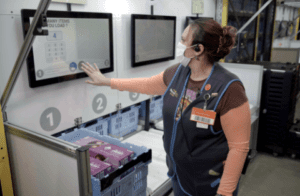 The name Lillie Elizabeth McGee Drennan probably doesn’t ring a bell, but as we enter March, which is Women’s History Month, it is a name worth knowing. Lillie Elizabeth McGee Drennan was the first licensed female truck driver and trucking firm owner. As a young woman, she started the Drennan Truck Line with her husband in 1928. While the business grew, she divorced her husband, leaving her as the sole owner of the trucking company. This, however, lead to many problems, as the industry became less forgiving to a woman without a husband. Drennan struggled to obtain a driver’s license from the Railroad Commission in charge of regulating motor-freight at the time, allegedly because of her hearing loss, though Drennan believed it to be related to her gender. After challenging the commission to find a man with a cleaner safety record than hers, the Railroad Commission relented and Drennan was awarded a license. For the following 24 years, Drennan was an accident-free driver and owner of an expanding trucking company. Despite discrimination because of her gender and disability, Lillie Drennan is remembered as a pioneer for women who want to work in industries traditionally dominated by men. And now on to this week’s logistics news.
The name Lillie Elizabeth McGee Drennan probably doesn’t ring a bell, but as we enter March, which is Women’s History Month, it is a name worth knowing. Lillie Elizabeth McGee Drennan was the first licensed female truck driver and trucking firm owner. As a young woman, she started the Drennan Truck Line with her husband in 1928. While the business grew, she divorced her husband, leaving her as the sole owner of the trucking company. This, however, lead to many problems, as the industry became less forgiving to a woman without a husband. Drennan struggled to obtain a driver’s license from the Railroad Commission in charge of regulating motor-freight at the time, allegedly because of her hearing loss, though Drennan believed it to be related to her gender. After challenging the commission to find a man with a cleaner safety record than hers, the Railroad Commission relented and Drennan was awarded a license. For the following 24 years, Drennan was an accident-free driver and owner of an expanding trucking company. Despite discrimination because of her gender and disability, Lillie Drennan is remembered as a pioneer for women who want to work in industries traditionally dominated by men. And now on to this week’s logistics news.
- Ukraine in the news:
- Walmart steps up automated store distribution
- Cyberattack on Toyota’s supply chain shuts 14 Japanese factories
- E2open acquires Logistyx Technologies
- Xerox addresses $300m backlog due to supply shortages
- Maritime partners finalize plan to expand chassis pool, fight port congestion
- Liquor stores in Canada pull Russian products from shelves
- US goods trade deficit hits record high
 As Clint Reiser pointed out earlier this week, the Russian invasion of Ukraine is impacting global supply chains. The world’s biggest container ship operators, A.P. Moller-Maersk A/S and Mediterranean Shipping Co., said they would temporarily suspend services to Russian ports, including those far from the conflict in Ukraine. Maersk said Tuesday it was halting bookings in light of the sanctions imposed on Russia, including congestion being caused by customs authorities inspecting cargo bound for the country and changing credit terms impacting its customers. Maersk and MSC said they would continue to move foodstuffs to and from Russia. The invasion is causing major disruptions for the global shipping industry, with hundreds of vessels trapped at ports, cargo being derailed, and freight rates surging. The impact is most severe in the Black Sea where some commercial ships are being fired upon or detained, but it is also being felt far from the conflict zone, according to shipping executives and brokers. The disruptions are adding strains to a global supply chain already stressed from two years of pandemic imbalances.
As Clint Reiser pointed out earlier this week, the Russian invasion of Ukraine is impacting global supply chains. The world’s biggest container ship operators, A.P. Moller-Maersk A/S and Mediterranean Shipping Co., said they would temporarily suspend services to Russian ports, including those far from the conflict in Ukraine. Maersk said Tuesday it was halting bookings in light of the sanctions imposed on Russia, including congestion being caused by customs authorities inspecting cargo bound for the country and changing credit terms impacting its customers. Maersk and MSC said they would continue to move foodstuffs to and from Russia. The invasion is causing major disruptions for the global shipping industry, with hundreds of vessels trapped at ports, cargo being derailed, and freight rates surging. The impact is most severe in the Black Sea where some commercial ships are being fired upon or detained, but it is also being felt far from the conflict zone, according to shipping executives and brokers. The disruptions are adding strains to a global supply chain already stressed from two years of pandemic imbalances.
The global chip industry is dealing with a variety of issues and shortages. And the Russian invasion of Ukraine is only going to exacerbate the problem. Experts warn that the conflict could impact the global chip industry and exacerbate current chip shortages. According to research firm Techcet, Ukraine supplies more than 90 percent of the US’s semiconductor-grade neon, a gas integral to the lasers used in the chip-making process, while Russia supplies 35 percent of the US’s palladium supply, a rare metal that can be used to create semiconductors. While the Semiconductor Industry Association (SIA) argues “the semiconductor industry has a diverse set of key materials and gases, so we do not believe there are immediate supply disruption risks related to Russia and Ukraine,” the long-term impact of the conflict remains unclear.
 As Walmart continues to dive deeper into store fulfillment, the company has been redesigning its retail technology to support this new supply chain model. Walmart has increased the number of digital orders coming from its stores by 170 percent in the last year, leading it to “scale its automated market fulfillment centers, tap machine learning, and test autonomous delivery,” according to a recent news release. To support this changing dynamic, Walmart has built a technology platform that powers its last-mile delivery ecosystem. Agnostic to supply and demand, and built around its own marketplace, the platform uses automation and machine learning to turn a “near-infinite” number of factors into usable data. The next phase of Walmart’s store integration and evolution is adding more market fulfillment centers to stores. Market fulfillment centers are a compact, modular warehouse built inside or added to a store, which, in addition to fresh and frozen items, can store thousands of the items.
As Walmart continues to dive deeper into store fulfillment, the company has been redesigning its retail technology to support this new supply chain model. Walmart has increased the number of digital orders coming from its stores by 170 percent in the last year, leading it to “scale its automated market fulfillment centers, tap machine learning, and test autonomous delivery,” according to a recent news release. To support this changing dynamic, Walmart has built a technology platform that powers its last-mile delivery ecosystem. Agnostic to supply and demand, and built around its own marketplace, the platform uses automation and machine learning to turn a “near-infinite” number of factors into usable data. The next phase of Walmart’s store integration and evolution is adding more market fulfillment centers to stores. Market fulfillment centers are a compact, modular warehouse built inside or added to a store, which, in addition to fresh and frozen items, can store thousands of the items.
Supply chain cyberattacks have been on the rise, and most industries have been looking at ways to mitigate the impact. Toyota Motor will restart domestic production after a cyberattack on a supplier ground the automaking giant’s factories to a one-day halt, sparking concerns about vulnerability in Japan Inc’s supply chain. It came just after Japan joined Western allies in clamping down on Russia in response to the invasion of Ukraine, although it was unclear whether the attack was related. Cybersecurity has emerged as a key area of concern in Japan, where government critics say responses to hacking threats have been hampered by a fractured approach: an attack on a hitherto obscure supplier was enough to bring one of the world’s mightiest manufacturers to a domestic standstill. No information was available about who was behind the attack, nor the motive.
 E2open continues to expand its end-to-end supply chain portfolio, building on its acquisitions of INTTRA, Cloud Logistics, and Amber Road, with the acquisition of Logistyx Technologies, a leader in global parcel and e-commerce shipping and fulfillment technology. With the combination, E2open enhances its global footprint for multi-carrier e-commerce shipment management, offering companies a complete range of shipping capabilities needed to scale and respond to growing market needs. E2open acquired Logistyx Technologies for a total purchase price of $185 million, including $90 million paid in cash at closing and the remaining balance to be paid in two additional installments at 90 days and 180 days post-closing. E2open has the option to finance the remaining payments through cash or a combination of cash and E2open stock issued to sellers, at the company’s discretion.
E2open continues to expand its end-to-end supply chain portfolio, building on its acquisitions of INTTRA, Cloud Logistics, and Amber Road, with the acquisition of Logistyx Technologies, a leader in global parcel and e-commerce shipping and fulfillment technology. With the combination, E2open enhances its global footprint for multi-carrier e-commerce shipment management, offering companies a complete range of shipping capabilities needed to scale and respond to growing market needs. E2open acquired Logistyx Technologies for a total purchase price of $185 million, including $90 million paid in cash at closing and the remaining balance to be paid in two additional installments at 90 days and 180 days post-closing. E2open has the option to finance the remaining payments through cash or a combination of cash and E2open stock issued to sellers, at the company’s discretion.
![]() As companies across every industry grapple with and try to navigate supply chain shortages, Xerox is looking at alternative ways in manufacturing, transportation, and labor as it has $300 million in backlog orders it can’t ship out. According to Steve Bandrowczak, Xerox president and COO, “we are looking for alternative chips. We’re looking for alternative components in terms of manufacturers. We look at secondary chips and how we can engineer those chips into our products so we can diversify them.” The second aspect is getting the company’s hands on those materials, whether by sea or air. And the third component is labor, or the lack thereof, by looking at both existing partners and alternative partners to help with labor constraints.
As companies across every industry grapple with and try to navigate supply chain shortages, Xerox is looking at alternative ways in manufacturing, transportation, and labor as it has $300 million in backlog orders it can’t ship out. According to Steve Bandrowczak, Xerox president and COO, “we are looking for alternative chips. We’re looking for alternative components in terms of manufacturers. We look at secondary chips and how we can engineer those chips into our products so we can diversify them.” The second aspect is getting the company’s hands on those materials, whether by sea or air. And the third component is labor, or the lack thereof, by looking at both existing partners and alternative partners to help with labor constraints.
 In the industry’s latest maneuver to relieve container port congestion, a public/private partnership of five maritime logistics groups today said they had agreed to establish a new South Atlantic Chassis Pool set to begin operations in October 2023. The deal finalizes a concept announced in July 2021 to add intermodal freight capacity at a time when supply chains continue to be pinched by severe port backups and container shortages. The new pool, to be known as SACP 3.0, will include participation from the Ocean Carrier Equipment Management Association (OCEMA), Consolidated Chassis Management LLC (CCM), Georgia Ports Authority (GPA), Jacksonville Port Authority (JAXPORT), and North Carolina State Ports Authority (NC Ports). The pool will offer 60,000 chassis to truckers, beneficial cargo owners, ocean carriers, and other port users, allowing them to better manage the tremendous import growth seen in recent years.
In the industry’s latest maneuver to relieve container port congestion, a public/private partnership of five maritime logistics groups today said they had agreed to establish a new South Atlantic Chassis Pool set to begin operations in October 2023. The deal finalizes a concept announced in July 2021 to add intermodal freight capacity at a time when supply chains continue to be pinched by severe port backups and container shortages. The new pool, to be known as SACP 3.0, will include participation from the Ocean Carrier Equipment Management Association (OCEMA), Consolidated Chassis Management LLC (CCM), Georgia Ports Authority (GPA), Jacksonville Port Authority (JAXPORT), and North Carolina State Ports Authority (NC Ports). The pool will offer 60,000 chassis to truckers, beneficial cargo owners, ocean carriers, and other port users, allowing them to better manage the tremendous import growth seen in recent years.
 Going back to the Russia – Ukraine news, more and more companies, organizations, and sports leagues are removing Russian goods and services from their respective portfolios. The Liquor Control Board of Ontario (LCBO), the Newfoundland and Labrador Liquor Corporation, Manitoba Liquor Mart, and the Nova Scotia Liquor Corporation will all remove Russian products. Ontario Finance Minister Peter Bethlenfalvy said he will tell the LCBO to stop selling the products. The move comes hours after provincial Liberal Leader Steven Del Duca wrote to the LCBO’s CEO with a similar request.
Going back to the Russia – Ukraine news, more and more companies, organizations, and sports leagues are removing Russian goods and services from their respective portfolios. The Liquor Control Board of Ontario (LCBO), the Newfoundland and Labrador Liquor Corporation, Manitoba Liquor Mart, and the Nova Scotia Liquor Corporation will all remove Russian products. Ontario Finance Minister Peter Bethlenfalvy said he will tell the LCBO to stop selling the products. The move comes hours after provincial Liberal Leader Steven Del Duca wrote to the LCBO’s CEO with a similar request.
“Ontario joins Canada’s allies in condemning the Russian government’s act of aggression against the Ukrainian people and will direct the LCBO to withdraw all products produced in Russia from store shelves.”
And finally, the US trade deficit in goods widened sharply to a record high in January amid an increase in imports as businesses continued to replenish depleted inventories. The pace of inventory accumulation reported by the Commerce Department on Monday was, however, slower than in recent months. That, together with the surge in the goods trade deficit, prompted economists at Goldman Sachs to lower their gross domestic product growth estimate for the first quarter by 0.5 percentage point to a 1.5 percent annualized rate. The economy grew at a 7 percent pace in the fourth quarter, with inventories contributing a whopping 4.90 percentage points.
That’s all for this week. Enjoy the weekend and the song of the week, the Schuyler Sisters, from Hamilton.

















